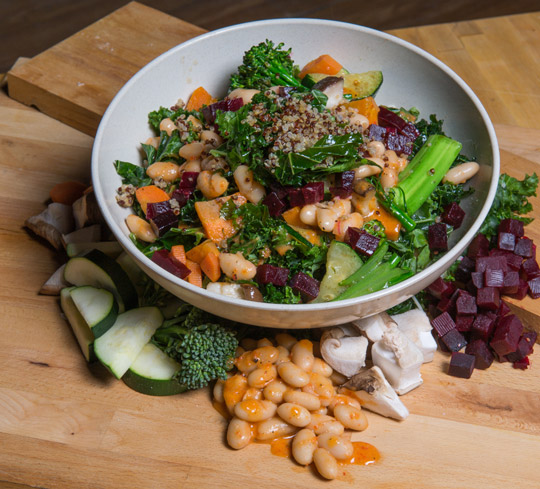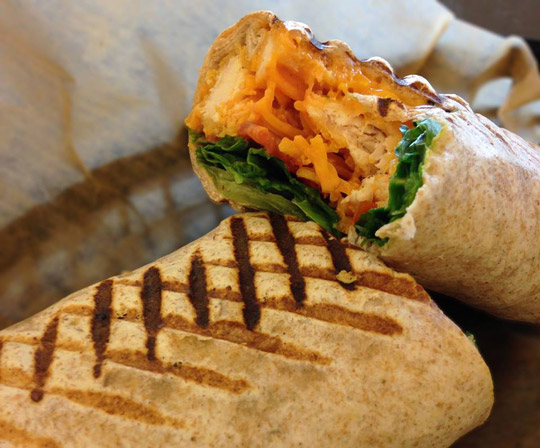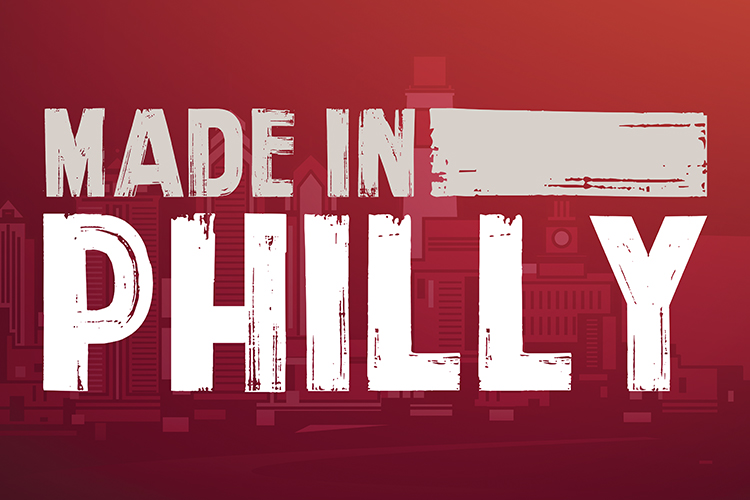b.good’s White Bean & Rosemary Quinoa Kale Bowl has organic quinoa, kale, veggies, shiitakes, beets, cannellini beans, parmesan cheese and a red pepper vinaigrette.
Can grab-and-go food be good for you?
Two suburban restaurants say yes.
There is hardly an idea more counterintuitive than that of a healthy, fresh fast food restaurant—especially one with a commitment to sourcing locally. Two local entrepreneurs hope to change that, and they’re starting in the suburbs.
This summer saw the grand opening in Marlton, New Jersey, of the tri-state area’s first b.good, a Boston-based chain of fast-casual eateries on a mission to reimagine the fast-food model as one centered on “real food and real people,” Deb Lutz, who owns the restaurant’s franchise rights for the greater Philadelphia area, connected with local food advocate Fair Food, and plans to open five such restaurants in and around the city in the next few years. Patrons can have their choice of local, grass-fed beef, hormone-free poultry, a house-made vegan patty on a host of burgers and sandwiches, or opt for a kale and quinoa bowl or seasonal salad.
“People really want know where their food is coming from, they want know what’s in it, they want to make sure it’s good for them and good for their families,” says Lutz, who worked in Johnson & Johnson’s marketing department for 20 years.
“Twenty years ago, it was the want to understand salt content, and then 10 years [ago] it was fat and trans fat,” she says. “And now it’s really about not just understanding the nutritional content of food, but also the sources of the supply.”
Across the Delaware, another restaurateur, Bryn Davis, has his sights set on spreading the gospel of healthy fast food to suburban America. Bryn and Dane’s, named after Davis and his 14-year-old brother, Dane, aims to open up two new locations in the coming year in Plymouth Meeting and Ambler, in addition to the flagship location in Horsham, which opened in 2012.
Bryn and Dane’s Tennessee Bleu wrap has crispy chicken, tomatoes, Romaine, cheddar and spicy Tennessee bleu sauce.Davis, who launched the brand with $12,000 he earned working at his grandfather’s farm for a year, says that for fresh, healthy food to break out of the niche market, it has to be as approachable as possible.
“My thing is, if there’s a guy coming off a construction site and he walked into our location, would he feel alienated or stupid ordering something? A lot of time at healthy restaurants, that happens,” says Davis, whose menu features a diverse lineup of smoothies, wraps and
“grab-and-go” offerings like house-made popcorn and nut mixes. Vegetarians have the option to swap out the prominently featured lean grilled chicken for a non-meat option like a black bean burger or grilled portabella mushroom.
Both Lutz and Davis agree that this feels like a turning point for casual dining in America.
“I feel like as our generation gets more buying power, it’s going to be completely in demand,” says Davis. “I think at this point, it’s almost like an evolution or an education. I don’t think we’re ever going to turn back and say ‘screw it, let’s have unnatural foods again.’ I think it has enough momentum where it’s not gonna stop.”






